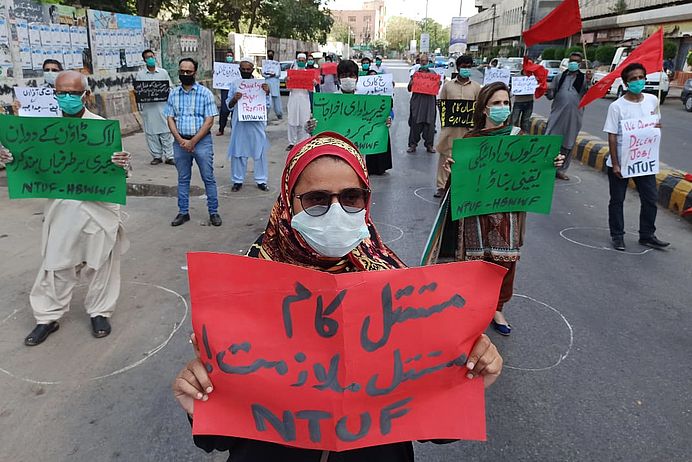Regardless of whether he comments on the apocalyptic conditions in Lesbos refugee camps or on the question of the debts with which the World Bank and IMF are making the states of the global south submissive to capital, Minister Müller is the Berlin politician one can spontaneously agree with. This makes the head of the Federal Ministry for Economic Cooperation and Development almost the only one who can do so, even across party lines (he’s member oft he right wing Christian Social Union of Bavaria, TRS). This also applies to one, if not the core problem of today's global politics, that of global production and supply chains.
On a visit to South Asia, the subcontinent from which we all get our jeans and T-shirts, the minister says that our closer relations in the South "must not lead to fewer human rights". Consequently, he leaves no doubt that the time of "voluntary self-commitments" by world market companies has expired, and that it must therefore be a matter of the punitive compulsory commitment of business to human rights.
Under the conditions of Corona
But here the positive ends. Müller did indeed circulate the draft of a supply chain law last year. But whistled back by a chorus of company managers and their submissive politicians* who did not shy away from sheer infamy, the textile seal of the "Green Button" was only intended to protect his face: the seal will only conceal, not put an end to the human rights crimes in textile production that have always already been committed in the asymmetrical power structure of the global production and supply chains, but are always intentional.
After all: Müller now, in the times of Corona, took a second attempt at a supply chain law, this time with the support of the Federal Ministry of Labour. But one could not be more shamelessly thwarted. The Federal Chancellery and the Federal Minister of Economics, Altmaier, immediately stood by their companies, Altmaier even made it quite explicitly clear that the German economy could not be expected to exercise a human rights commitment, especially not under the conditions of the Corona crisis.
What this means has become clear in the last two weeks. First, it became known that international companies, including German companies, had been withholding, reducing and finally suspending payments to their contractors in the South for months in anticipation of a crisis. Then it became public that they have simply cancelled orders worth billions, a step that may even violate business-friendly commercial law.
After all, one had to learn that the cancellations were even related to orders already in production and to orders that had already been completed: tons of textiles also for German markets, which are now ready for transport in the ports of Dhaka and Karachi, but will probably not be collected. Defencelessly at the mercy of the criminal energy of their principals in Europe, North America or China, thousands of South Asian factories were forced to close down within a week, millions of workers were laid off in whole or in part and are now literally faced with nothing: hunger and homelessness. For every one of them there are up to eight people whose survival depends on their already ridiculously low incomes.
Global redistributions
What this means can be seen from what the medico partners in Pakistan and Bangladesh are currently forced to do, the Pakistani National Trade Union Federation (NTUF) and the Bangladeshi National Garment Workers Federation (NGWF). Both are distributing relief supplies to thousands of workers' families to fight hunger and provide first aid in case of illness for at least the next month. Working around the clock on activities that are not really the responsibility of an union, the NTUF has at least had the opportunity to call for a Pakistani government aid program that provides wage replacement benefits as well as comprehensive measures to protect against the corona epidemic.
In a joint statement with three other trade unions, the NGWF in turn demanded reimbursement of the outstanding wages for March and April, continued wage payments until the end of the Corona crisis, the withdrawal of the dismissals and systematic social security aid. The problem is that neither the Pakistani or Bangladeshi state nor the companies in these countries are in a position to meet these demands: even if they were willing to do so.
Minister Müller also commented on this immediately. He not only announced extensive corona-related reallocations of German development aid, but also made the right demand that German state aid to German companies should also be passed on in part to their contractors in the South. At the same time, he expressly called on the 20 most important industrialized and emerging countries to make a "debt cut" for the countries of the global South. All of these are undoubtedly unavoidable steps, and measures on top of that, in which we will have to go much further than has been foreseeable so far: not only, but even more so, when the pandemic spreads and deepens.
And yet it is still a matter of going one decisive step further: the step that Müller already wants to take with regard to a supply chain law. After all, it is not just a global aid programme, for which the states of the global North are in fact primarily responsible. Nor is it just about global redistribution policies, as inevitable as they have been for years. Rather, it is about an explicitly political solution, and it is about human rights, the one in the other.
Global social human rights policy
Under the conditions of Corona, the first step we think of here is the human right to equal access to health for all. Politically it is already guaranteed to all people: its practical implementation now requires a global social infrastructure that can ensure basic health care worldwide. At the same time, such a global social infrastructure would not only have to be one of health, but also of housing and education. It would also have to guarantee all social, economic and cultural human rights, for all and for each individual.
In order to be able to democratically determine the design of such a global social infrastructure, this global social infrastructure would also have to be subject to political human rights, the right to the integrity of the person, to freedom of opinion and assembly, not least the right to freedom of movement and, of course, the right to protection against all forms of discrimination. The human rights exemption of all individuals without exception to assume their freedom in equality would then have to be promoted according to the current Spanish model. Spain has just announced that it will provide its citizens* with a lifelong basic income. This had been planned for some time, the Corona crisis has accelerated the implementation. This is right, and it is especially right that it should not be regarded as a wage replacement benefit, which would maintain the link between work and income. But it is also right to make it available worldwide, and not only to the citizens of Spain or the European Union.
Taken together, a global social infrastructure and a global basic social income not only promote individual and collective human rights. They also guarantee their indivisible link in Article 28 of the Universal Declaration of Human Rights, which states that "Everyone is entitled to a social and international order in which the rights and freedoms set forth in this Declaration can be fully realized".
The declaration signed by all member states of the UN and thus also by the Federal Republic of Germany, and thus recognized as binding, speaks at this point in a considered and deliberate manner of the "full realization" of human rights, not of a merely partial realization. It is also not to be understood as a mere declaration of intent, but as a binding obligation to think and act. When, if not now, is it high time for this?
The material and political means for such a global political solution, as the Corona crisis proves, have long been available: If it is possible within weeks to shut down the high-speed storm of global capital in a week's time, then much more is possible. What is missing, however, is the political will. A well-meaning politician alone cannot change anything about this: as Gerd Müller shows, all he can do by himself are green buttons.
For the realization of what is possible, necessary, right and just, a global political struggle is needed. Such a struggle must be more than a labour dispute, but also more than a struggle to save the thousands upon thousands of refugees whom the European Union of the Altmaiers will simply let die if we do not all work together to stop them. And now that the time is ripe, someone must take the first step, the step that could then set off a chain reaction.
Minister Müller is not the only one currently calling for a debt cut in favour of the countries of the global South. He is also responding to Pakistan's Prime Minister Imran Khan, who, in the face of the Corona crisis, has politely asked that the country, which is of course bankrupt also on its own responsibility, at least be granted an extension of its piled up debts: a request not only to the International Monetary Fund and the West, but also to China.
Pakistan's medico partner NTUF, however, is now calling on Khan to unilaterally stop debt service, while at the same time cutting all non-development-related government spending, including the defense budget, by half. The funds thus saved are then to be fed into a "universal social security system" in the spirit of Article 38 of the Pakistani constitution. If Pakistan remained alone with such a step, Khan would have to row back as Minister Müller had to do with his Supply Chain Law. There is no doubt that the Altmaiers of this world would see to that, for the benefit of the structures of exploitation, impoverishment and disregard that they are there to preserve and expand. If, however, first five, then ten, then 50 countries of the global South joined the Prime Minister of Pakistan, if not everything, then at least many things could topple. From a standing position, like the Corona-shut down.
The Tennis Court Oat of the 21st century
Someone has to take the first step now: not to finish the journey alone, but to break the dams. In this respect, the Corona period resembles the period immediately before the French Revolution, the period just before the proclamation of the first Declaration of Human Rights. To remedy a serious financial crisis, the French King then called - for the first time in 175 years! - the "General Assembly", a kind of parliament in which the nobility, clergy and Third Stand were represented with equal votes. The representatives of the Third Stand first forced the crisis-ridden King to double the number of seats they were entitled to and then demanded that only the individual votes be counted in future votes. This would have given them the majority, supported by sympathisers from the nobility and clergy. Their demands were rejected again and again - just as it happens today to everyone who demands a debt cut, a punitive supply chain law or the rescue of the people on the Lesbos refugee camps.
At that time, in 1789, the representatives of the Third Stand declared themselves in return to the "National Assembly", and they referred to the fact that they represented 98% of all French*. The King immediately closed the Assembly, which he was entitled to do at the time. The deputies, however, simply stayed together and swore to each other that they would only split up when the country would have a new constitution. After the place of their historic assembly, this is now called the "Tennis Court Oath". It was the dam that the Déclaration des Droits de l'Homme et du Citoyen, the Declaration of the Rights of Man and Citizens*, ratified just a few months later: to a law that is still in force today, although still not enforced.
The same Declaration of the Rights of Man and Citizens* now demands, under the conditions of Corona, debt cancellation, the full application of human rights, also and especially in the global production and supply chains, and the completion of the right to freedom of movement, which has been in force since 1789, by means of a right to safe arrival, with the recognition of all human rights without exception. It calls for a global social infrastructure and a global basic income to decouple work and income and to lay the foundation for a development model that is socially and ecologically compatible for all, in times of corona as well as under the climate collapse.
There is nothing to prevent the very first step towards enforcing these demands being taken by a Pakistani prime minister. All he would have to do - it is as simple as that - is to give credible assurances that otherwise he would not be able to protect the people of his country from the corona virus or from the infamy of the international textile industry. He has already done that, and he is right to do so. However, it does not depend on this minister: the very first step could be taken somewhere else by someone else with the same right. In the final analysis, it depends on the oath of those who give him or her the right to do so, in the full sense of the word. As things stand, the call to do so will go out to us all, everywhere. It is meant everybody for him-or herself.



